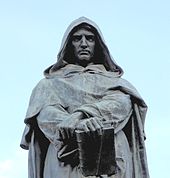Freedom of thought
This article is written like a personal reflection, personal essay, or argumentative essay that states a Wikipedia editor's personal feelings or presents an original argument about a topic. (July 2018) |

Freedom of thought is the freedom of an individual to hold or consider a fact, viewpoint, or thought, independent of others' viewpoints.
Overview
Every person attempts to have a cognitive proficiency by developing knowledge, concepts, theories and assessing them in the given environment. This cognitive proficiency gives a sense of contentment and replaces the feeling of helplessness. Apart from bringing ease to the ego of a person, new knowledge and ideas also bring a hope for the future.[1]
Freedom of thought is the precursor and progenitor of—and thus is closely linked to—other liberties, including freedom of religion, freedom of speech, and freedom of expression.[2] Though freedom of thought is axiomatic for many other freedoms, they are in no way required for it to operate and exist. The conception of a freedom or a right does not guarantee its inclusion, legality, or protection via a philosophical caveat. It is a very important concept in the Western world and nearly all democratic constitutions protect these freedoms.
For instance, the
Freedom of thought... is the matrix, the indispensable condition, of nearly every other form of freedom. With rare aberrations a pervasive recognition of this truth can be traced in our history, political and legal.[3]
Such ideas are also a vital part of international human rights law. In the Universal Declaration of Human Rights (UDHR), which is legally binding on member states of the International Covenant on Civil and Political Rights (ICCPR), "freedom of thought" is listed under Article 18:
Everyone has the right to freedom of thought, conscience and religion; this right includes freedom to change his religion or belief, and freedom, either alone or in community with others and in public or private, to manifest his religion or belief in teaching, practice, worship and observance.
The
Article 9 of the European Convention on Human Rights states, "Everyone has the right to freedom of thought, conscience and religion."[5]
History of development and suppression
It is impossible to know with certainty what another person is thinking, making suppression difficult. The concept is developed throughout the Bible, most fully in the writings of

Although Greek philosophers
Oliver Cromwell is described by Ignaz von Döllinger as "the first among the mighty men of the world to set up one special religious principle, and to enforce it so far as in him lay: ... The principle of liberty of conscience and the repudiation of religious coercion".[11]
However,
The
More recently, the development of neuroimaging technologies have raised concerns about entities being able to read and subsequently suppress thought. Although the issue is complicated by the mind-body problem, these concerns form the emerging field of neuroethics and neuroprivacy.
See also
References
- S2CID 144126437.
- S2CID 151827391.
- Palko v. State of Connecticut, 302 U.S. 319(1937).
- ^ "General Comment No. 22: The right to freedom of thought, conscience and religion (Art. 18) : . 30/07/93. CCPR/C/21/Rev.1/Add.4, General Comment No. 22. (General Comments)". United Nations Human Rights Website – Treaty Bodies Database. Office of the United Nations High Commissioner for Human Rights. 1993-07-30. Retrieved 2007-10-21.
- ^ "The European Convention on Human Rights". Council of Europe.
- ^ Eugene J. Cooper, "Man's Basic Freedom and Freedom of Conscience in the Bible : Reflections on 1 Corinthians 8–10", Irish Theological Quarterly Dec 1975
- ISBN 978-1596054486. Retrieved 15 September 2014.
- ^ Luzzatti, p. 91.
- ISBN 0312232519.
- ^ Arturo Labriola, Giordano Bruno: Martyrs of free thought no. 1
- ^ A.D. Lindsay: The Essentials of Democracy (2 ed.), 1948.
Further reading
- D.V. Coornhert, Synod on the Freedom of Conscience: A Thorough Examination during the Gathering Held in the Year 1582 in the City of Freetown English translation
- Richard Joseph Cooke, Freedom of thought in religious teaching (1913)
- Lucas Swaine, "Freedom of Thought as a Basic Liberty," Political Theory, 46:3 (2018): 405–425.
- Eugene J. Cooper, "Man's Basic Freedom and Freedom of Conscience in the Bible : Reflections on 1 Corinthians 8–10", Irish Theological Quarterly Dec 1975
- George Botterill and Peter Carruthers, 'The Philosophy of Psychology', Cambridge University Press (1999), p. 3
- The Hon. Sir John Laws, 'The Limitations of Human Rights', [1998] P. L. Summer, Sweet & Maxwell and Contributors, p. 260
- Voltaire (1954). "Liberté de penser". Dictionnaire philosophique. Classiques Garnier (in French). Paris: Éditions Garnier. pp. 277–81.
- Roger Williams, The Bloudy Tenent of Persecution for Cause of Conscience (1644; 1867 reprint)
- Samuel Rutherford, Lex, Rex (1644)
External links
- The Bloody Tenent of Persecution (1867 reprint) (accessed July 10, 2009, on Google Books)
- Dictionary of the History of Ideas: Academic Freedom
- The Center for Cognitive Liberty & Ethics – a network of scholars elaborating the law, policy and ethics of freedom of thought
- John Bagnell Bury (1861–1927) A History of Freedom of Thought
